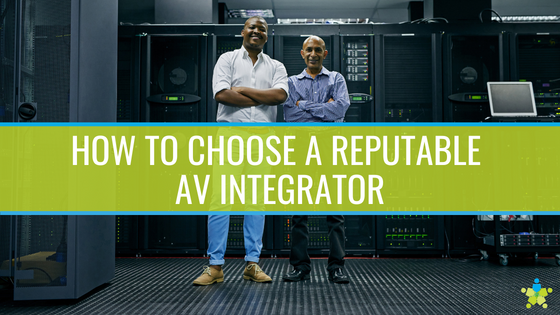[vc_row][vc_column][vc_column_text]There's room for an AV system in every organization, but AV is one of those things that companies can have trouble getting started with. That's why the typical business turns to a reputable AV integrator to install and support their AV projects.
The integration process is complex and requires expertise and commitment to the job. That means the challenge for your company is finding a reputable integrator to work with. Here, we've outlined what to look for in an AV integrator, so you can get the most from your AV solutions.[/vc_column_text][/vc_column][/vc_row][vc_row][vc_column][vc_column_text]
Certification with AV Technology and Design is a Must
No matter the industry, certification is a proven way to boost standards and skills. That's also true of the AV industry, where there are plenty of certification tracks to choose from. Ideally, organizations should choose an AV partner with a wide range of certifications, and here's why:- Integrators handle a staggering amount of audio and video technology – Reputable AV integrators must be familiar with a huge variety of AV products. That includes major solutions like video conferencing, wireless presentation systems, digital signage, interactive displays, and audio enhancement solutions. It also includes emerging solutions like augmented reality (AR) and virtual reality (VR). There's a lot of knowledge to keep up on, clearly, and certification can help AV professionals do just that.
- Certification demonstrates a commitment to success - Certification takes work to attain and maintain. There are also many certification options out there, so it takes even more work for a professional to round out their skills through education. This education is vital for job performance, and it indicates a desire to do the job properly.
- Certified integrators can handle a full range of AV services - It's very common for organizations to expand on their AV goals once an initial solution is in place. That's the power of effective AV. However, even if you have your needs mapped out, an integrator will be able to adapt when those needs inevitably change.
What Certification Tracks are Available to AV Integrators?
Among AV professionals, there is no shortage of certification tracks to choose from. However, the most popular and reputable certification programs are produced and delivered by the Audiovisual and Integrated Experience Association (AVIXA). A couple of AVIXA's standout certification offerings include:- Certified Technology Specialist (CTS) - AVIXA's CTS certification is a leading option for AV integrators, offering a strong collection of fundamental AV concepts. This includes the basics of audio and video, along with proper system design, installation, and networking. With CTS certification, AV technicians can develop and further their careers in many directions.
- CTS-I and CTS-D certification - Two of those directions include AV system installation and design. For technicians interested in installation, there's the CTS-I certification track, which focuses on proper installation processes and practices. For design-minded professionals, there's the CTS-D track, which teaches students the techniques involved in visualizing and crafting an effective AV solution.
- Vendor-specific certifications - In addition to AVIXA's certification options, there are many additional vendor-specific tracks. Certification in these tracks can help technicians specialize with certain products, like those offered by Poly or Crestron. Many organizations have one or more preferred AV brands, and it's better for those organizations to work with technicians certified in those brands' products.
AV Systems Require Ongoing Maintenance Following Installation. Will Your Integrator Provide It?
To extract maximum value from your AV solution, ongoing maintenance is highly recommended. Like with any technology, time and use will affect your system's performance. To ensure your AV solution provides long-term productivity, an experienced integrator will offer ongoing support through a maintenance agreement. That agreement typically includes the following:- Responsive onsite and remote technical support - The foundation of any maintenance agreement is technical support and service. It's common for integrators to offer this support through multiple channels, including e-mail and phone. If on-site service is needed, the integrator should be able to provide it during business hours, though some maintenance agreements come with 24/7/365 support.
- Preventative maintenance - Preventative maintenance spots emerging system issues before they cause downtime. During a preventative maintenance appointment, the technician will arrive onsite and inspect any equipment covered by the agreement. If there are any performance issues, they can be handled quickly.
- Assistance with warranties and shipping - Sometimes, hardware needs to be sent in for repair or replacement. There may be warranty-related concerns to consider during the process, too. It's practically impossible for organizations to keep up with details like equipment warranty status unless the task is delegated to someone specifically. As part of a maintenance agreement, this task can be delegated to the integrator. Further, the integrator will handle and oversee all shipping between the client and the manufacturer.
- Additional training - Training is a standard part of the integration package, but the occasional refresh or skill expansion is nice to have. As part of a maintenance agreement, the integrator will frequently offer additional training to keep user skills up to date.



